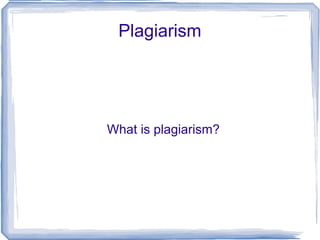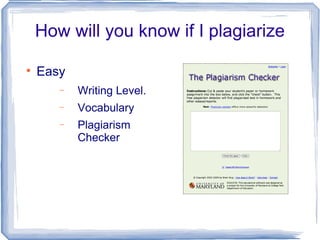Plagiarism
- 1. Plagiarism What is plagiarism?
- 2. Dictionary Definition The Oxford English Dictionary says it means '..to take and use as one's own the thoughts, writings, or inventions of another. ' (OED 1987)
- 3. What does it really mean? Plagiarism basically means that you use someone else's ideas as their own. In other words. It's cheating.
- 4. What does it look like? Original Source Material: Technology has significantly transformed education at several major turning points in our history. In the broadest sense, the first technology was the primitive modes of communication used by prehistoric people before the development of spoken language. Mime, gestures, grunts, and drawing of figures in the sand with a stick were methods used to communicate -- yes, even to educate. Even without speech, these prehistoric people were able to teach their young how to catch animals for food, what animals to avoid, which vegetation was good to eat and which was poisonous. Plagiarized Version: In examining technology, we have to remember that computers are not the first technology people have had to deal with. The first technology was the primitive modes of communication used by prehistoric people before the development of spoken language. http://www.indiana.edu/~istd/examples.html
- 5. What does it look like? Original Source Material: Technology has significantly transformed education at several major turning points in our history. In the broadest sense, the first technology was the primitive modes of communication used by prehistoric people before the development of spoken language. Mime, gestures, grunts, and drawing of figures in the sand with a stick were methods used to communicate -- yes, even to educate. Even without speech, these prehistoric people were able to teach their young how to catch animals for food, what animals to avoid, which vegetation was good to eat and which was poisonous. Plagiarized Version: In examining technology, we have to remember that computers are not the first technology people have had to deal with. The first technology was the primitive modes of communication used by prehistoric people before the development of spoken language. http://www.indiana.edu/~istd/examples.html
- 6. What should it look like then? Original Source Material: Technology has significantly transformed education at several major turning points in our history. In the broadest sense, the first technology was the primitive modes of communication used by prehistoric people before the development of spoken language. Mime, gestures, grunts, and drawing of figures in the sand with a stick were methods used to communicate -- yes, even to educate. Even without speech, these prehistoric people were able to teach their young how to catch animals for food, what animals to avoid, which vegetation was good to eat and which was poisonous. Correct Version : In examining technology, we have to remember that computers are not the first technology people have had to deal with. Frick (1991) believes that "... the first technology was the primitive modes of communication used by prehistoric people before the development of spoken language" (p. 10). References: Frick, T. (1991). Restructuring education through technology. Bloomington, IN: Phi Delta Kappa Educational Foundation. http://www.indiana.edu/~istd/examples.html
- 7. How will you know if I plagiarize Easy Writing Level. Vocabulary Plagiarism Checker
- 8. So, what's the big deal? First Offence : Lose Exemption in that course Second Offence : Lose Exemption in all courses Third Offence : Referral to the Office
- 9. How do I avoid plagiarism? Avoiding Plagiarism To be on the safe side, always make it clear where the information comes from. Your teacher will tell you how to do this. Sometimes, teachers ask kids to write a bibliography (say: bih-blee- ah -gruh-fee). That's a list of the sources you used for a project or report. To do that, you'll need to know the author, the title, and the date it was published. For instance, if you did a report on giraffes, you could give credit to an author this way: Smith, Hazel B. "All About Giraffes." 1995. But your most important guide on sourcing is your teacher. Different teachers will have different rules. If you're confused, ask questions to make sure you understand what your teacher expects. And if you write something really great about sharks or any other topic, maybe someday someone will be quoting you in a report! From: http://kidshealth.org/kid/feeling/school/plagiarism.html
- 10. Where can I learn more? http://www.plagiarism.org/index.html http://depts.drew.edu/composition/Avoiding_Plagiarism.htm http://owl.english.purdue.edu/owl/resource/589/01/ http://www.aresearchguide.com/6plagiar.html http://ec.hku.hk/plagiarism/introduction.htm










